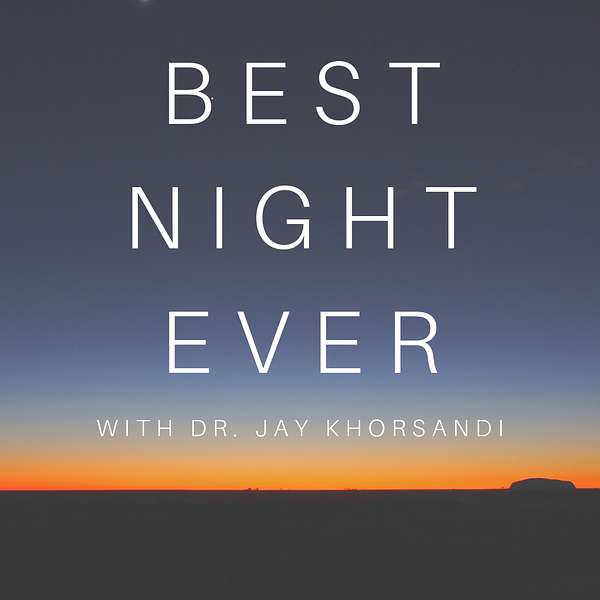
Best Night Ever!
Best Night Ever!
Sleep Optimization 101: Master Your Light, Temperature & Circadian Rhythms with Quick Tips
Use Left/Right to seek, Home/End to jump to start or end. Hold shift to jump forward or backward.
In this episode of Best Night Ever, we go far beyond the basics of sleep hygiene and unlock the science-backed secrets to transform your nights — and your days. Join Dr. Jay Khorsandi as we break down the three most potent levers for better sleep: light exposure, body temperature, and circadian rhythm alignment.
You’ll get practical hacks, advanced tools, and the latest research on:
☀️ Using morning sunlight and evening dimming to reset your internal clock
❄️ Optimizing bedroom temperature for deeper sleep
⏰ Anchoring your body’s circadian rhythm for peak energy, mood, and health
Plus, we cover smart tech, supplements, and a gold-standard wind-down routine you can start tonight. Whether you’re a biohacker or just tired of feeling exhausted, this episode will equip you with everything you need to wake up refreshed.
👉 Follow @sleepbiohacker on Instagram for daily tips, and don’t forget to share this episode with a friend!
Intro:
Welcome back to Best Night Ever, the podcast where we dive deep into the science and practical hacks for better sleep, wellness, and longevity. I’m your host, Dr. Jay Khorsandi.
If you’re not already following me, head over to Instagram @sleepbiohacker for daily tips and sleep hacks. And if you’d like to support the show, one of the best ways is by sharing it with a friend or posting on social media — tag me @sleepbiohacker so I can say thanks!
Today, we’re revisiting one of the most fundamental topics in sleep health — but we’re going way deeper. This episode is called Sleep Optimization 101, and we’re breaking down three of the most powerful, research-backed levers to transform your sleep:
- Light exposure
- Body temperature
- Circadian rhythms
Whether you’re a hardcore biohacker or just tired of waking up groggy, you’ll walk away with actionable tools you can start tonight.
Part 1: Light – The Master Regulator of Sleep
Let’s start with light — it’s the most powerful signal to your brain’s internal clock, but most people overlook it.
Your body runs on a circadian rhythm — roughly 24 hours — coordinated by a part of your brain called the suprachiasmatic nucleus. And the main signal that keeps this clock on time? Light.
Morning light:
- Exposing your eyes to natural sunlight within 30–60 minutes of waking helps increase cortisol, sharpen focus, and set a countdown timer for melatonin about 14–16 hours later.
✅ Get outside for 10–30 minutes in the morning — even if it’s cloudy.
✅ If you can’t, use a 10,000-lux light box for about 20 minutes.
✅ Skip the sunglasses; you need full-spectrum light to hit your retina.
Evening light:
- Artificial light, especially blue light, at night suppresses melatonin — sometimes delaying sleep by up to 90 minutes!
✅ Dim your lights 90 minutes before bed.
✅ Install f.lux or use Night Shift mode on devices.
✅ Switch to amber or red bulbs.
✅ Wear blue-blocking glasses.
Pro tip: Use smart bulbs like Philips Hue and set them to mimic sunset tones in the evening.
Part 2: Temperature – The Unsung Hero of Deep Sleep
Your core body temperature naturally drops by about 1°F at night, and this cooling helps trigger deep sleep.
Research shows that people who fail to cool down have longer sleep latency, lighter sleep, and more awakenings.
✅ Keep your bedroom between 60–67°F (15–19°C).
✅ Use cooling devices like the chiliPAD or Eight Sleep.
✅ Take a hot bath or shower 1–2 hours before bed — it helps your core temperature drop.
✅ Choose breathable fabrics like cotton, bamboo, or linen.
Advanced tip: Wearables like the Oura Ring or WHOOP can help monitor skin temperature and show how your environment affects your sleep.
Part 3: Circadian Rhythm Alignment – Stay on Time
Your circadian clock controls sleep, metabolism, hormones, mood, and immunity. Disruptions like jet lag or shift work can lead to brain fog, metabolic issues, and inflammation.
✅ Keep consistent bed and wake times — even on weekends.
✅ Eat meals at regular times.
✅ Dim lights and reduce stimulation 90 minutes before bed.
Tech tip: Use apps like Rise or Timeshifter to help adjust your rhythm, especially before travel.
Shift work note:
If you work nights, expose yourself to bright light during your shift, wear sunglasses on the way home, and blackout your bedroom to consolidate daytime sleep.
Supplements & Tools:
- Melatonin: 0.3–1 mg for jet lag or shift changes only.
- Magnesium glycinate: 200–400 mg to calm the nervous system.
- Glycine: 3g before bed — lowers core temp, improves deep sleep.
- Ashwagandha: May help reduce nighttime cortisol.
Optimized Wind-Down Routine:
8:30 PM → Shut off work, dim lights, switch devices to night mode.
9:00 PM → Hot shower, magnesium lotion on shoulders/neck.
9:30 PM → Gentle stretching, journaling, or 4-7-8 breathing.
10:00 PM → In bed, room dark and cool, no electronics.
Morning → Wake up, hydrate, and get sunlight.
Scientific Updates & Tools:
- JAMA Neurology (2023): Irregular sleep increases Alzheimer’s risk ~30%.
- Stanford (2022): Glycine enhances slow-wave sleep, shortens sleep onset.
- Oura, WHOOP, Apple Watch: Great for tracking HRV, sleep stages, and rhythm.
Outro:
That wraps up today’s deep dive into Sleep Optimization 101! We covered the science and strategies behind light, temperature, and circadian rhythms — and added advanced tips, tools, and the latest research.
Remember, the magic isn’t in doing everything perfectly; it’s in making small, consistent changes.
👉 Don’t forget to follow me on Instagram @sleepbiohacker for daily sleep tips, and if you enjoyed this episode, share it with a friend or tag me — I love hearing from you!
Disclaimer: This podcast is for informational purposes only and does not constitute medical advice. Always consult your healthcare provider before making changes to your health routine.